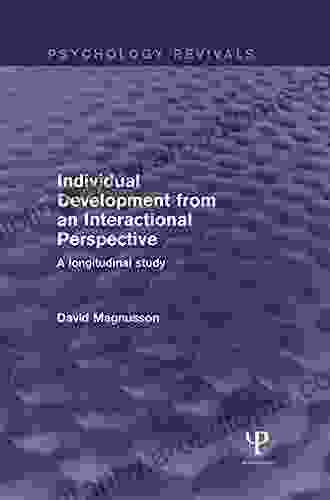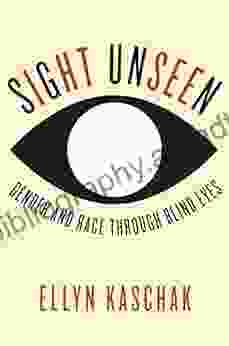Individual Development From An Interactional Perspective: Unlocking Human Potential

The journey of human development is a complex and multifaceted one, influenced by a myriad of factors that shape our thoughts, behaviors, and overall well-being. Among these influential forces, the interactional perspective in psychology stands out as a particularly insightful approach to understanding the intricate interplay between individuals and their social environments.
4.7 out of 5
| Language | : | English |
| File size | : | 2912 KB |
| Text-to-Speech | : | Enabled |
| Screen Reader | : | Supported |
| Enhanced typesetting | : | Enabled |
| Word Wise | : | Enabled |
| Print length | : | 243 pages |
This article delves into the fundamental concepts and practical applications of interactional psychology, exploring its transformative power in fostering individual development. By examining the reciprocal relationship between individuals and their surroundings, we gain a deeper appreciation for the profound impact that social interactions, cultural contexts, and personal experiences have on our growth and evolution.
Understanding Interactional Psychology
Interactional psychology, also known as social constructivism, is a theoretical framework that emphasizes the dynamic relationship between individuals and their social contexts. This perspective views development as a continuous process of interaction and exchange, where individuals actively construct their understanding of the world through their interactions with others.
According to interactional psychology, the development of the self, cognitive abilities, and behaviors is shaped by the social and cultural environment in which individuals are embedded. Through ongoing interactions and experiences, individuals internalize societal norms, values, and beliefs, which influence their perceptions, thoughts, and actions.
Key Concepts of Interactional Psychology
- Reciprocal Relationship: Individuals and their social environments are mutually influential, shaping each other in a continuous process of interaction.
- Social Construction of Reality: Individuals construct their understanding of the world through their social experiences, influenced by cultural norms, societal expectations, and interpersonal relationships.
- Zone of Proximal Development: This concept refers to the difference between what an individual can achieve independently and what they can accomplish with the guidance and support of others, highlighting the importance of social interaction in cognitive development.
- Scaffolding: Scaffolding is the temporary support provided by others to help individuals develop new skills or knowledge, gradually reducing assistance as the individual gains proficiency.
Applications in Fostering Individual Development
The principles of interactional psychology have far-reaching applications in promoting individual development across various domains, including:
Cognitive Development
Interactional psychology underscores the role of social interaction in cognitive development. Through conversations, discussions, and problem-solving activities, individuals engage with others to construct knowledge and expand their understanding of the world. Social interactions provide opportunities for cognitive scaffolding, where more knowledgeable individuals guide learners through the zone of proximal development.
Socio-Emotional Development
Social interactions are crucial for the development of emotional intelligence, self-regulation, and interpersonal skills. Through interactions with peers, family members, and educators, individuals learn how to navigate social situations, manage emotions, and establish meaningful relationships. Social support and guidance from others can foster a sense of belonging and self-worth.
Moral Development
Interactional psychology emphasizes the influence of social and cultural contexts on moral development. Individuals internalize societal norms and values through interactions with others, shaping their moral reasoning and ethical decision-making. Exposure to diverse perspectives and ethical dilemmas encourages critical thinking and the development of a personal moral compass.
Educational Implications
Interactional psychology has significant implications for educational practices. It advocates for a student-centered approach that recognizes the importance of social interaction and collaboration in learning. Teachers can foster a supportive learning environment that encourages dialogue, peer learning, and scaffolding to promote students' cognitive and social development.
Enhancing Individual Growth and Transformation
By embracing the principles of interactional psychology, we can harness the transformative power of social interactions to enhance individual growth and development. Here are some practical ways to apply this approach:
- Seek Meaningful Interactions: Engage in conversations and activities with diverse individuals who challenge your perspectives and broaden your horizons.
- Build Supportive Relationships: Surround yourself with supportive family, friends, or mentors who provide encouragement, guidance, and emotional support.
- Embrace Cultural Diversity: Interact with individuals from different cultural backgrounds to gain exposure to alternative perspectives and expand your understanding of the world.
- Engage in Reflective Practice: Regularly reflect on your interactions and experiences to gain insights into your own development and identify areas for improvement.
The interactional perspective in psychology provides a profound understanding of the intricate relationship between individuals and their social environments. By recognizing the reciprocal influence between the two, we gain a deeper appreciation for the transformative power of social interactions in shaping our cognitive, socio-emotional, and moral development.
Embracing the principles of interactional psychology allows us to create supportive environments that foster individual growth and empower individuals to reach their full potential. Through meaningful interactions, diverse experiences, and reflective practices, we can unlock the transformative potential of human development and embark on a lifelong journey of self-discovery and personal transformation.

4.7 out of 5
| Language | : | English |
| File size | : | 2912 KB |
| Text-to-Speech | : | Enabled |
| Screen Reader | : | Supported |
| Enhanced typesetting | : | Enabled |
| Word Wise | : | Enabled |
| Print length | : | 243 pages |
Do you want to contribute by writing guest posts on this blog?
Please contact us and send us a resume of previous articles that you have written.
 Book
Book Novel
Novel Page
Page Chapter
Chapter Text
Text Story
Story Genre
Genre Reader
Reader Library
Library Paperback
Paperback E-book
E-book Magazine
Magazine Newspaper
Newspaper Paragraph
Paragraph Sentence
Sentence Bookmark
Bookmark Shelf
Shelf Glossary
Glossary Bibliography
Bibliography Foreword
Foreword Preface
Preface Synopsis
Synopsis Annotation
Annotation Footnote
Footnote Manuscript
Manuscript Scroll
Scroll Codex
Codex Tome
Tome Bestseller
Bestseller Classics
Classics Library card
Library card Narrative
Narrative Biography
Biography Autobiography
Autobiography Memoir
Memoir Reference
Reference Encyclopedia
Encyclopedia Evan Baruch
Evan Baruch Paul Little
Paul Little Sir John Whitmore
Sir John Whitmore Fiona Macdonald
Fiona Macdonald Josephine Ross
Josephine Ross Eric Patterson
Eric Patterson Jack Conner
Jack Conner Quick Simple Guides
Quick Simple Guides Eric Booth
Eric Booth Mary Pipher
Mary Pipher Esther Jungreis
Esther Jungreis Firdos Alam Khan
Firdos Alam Khan Mary Wanless
Mary Wanless Erica Armstrong
Erica Armstrong Miles Carter
Miles Carter Ennio Peres
Ennio Peres Scott F Birkermaier
Scott F Birkermaier Jennifer Mckay
Jennifer Mckay Emily Hopkins
Emily Hopkins Erik D Demaine
Erik D Demaine
Light bulbAdvertise smarter! Our strategic ad space ensures maximum exposure. Reserve your spot today!

 Drew BellUnveiling Health Disparities in Respiratory Medicine: Exploring the Impact on...
Drew BellUnveiling Health Disparities in Respiratory Medicine: Exploring the Impact on... Colby CoxFollow ·19.5k
Colby CoxFollow ·19.5k Gabriel MistralFollow ·2.6k
Gabriel MistralFollow ·2.6k Richard WrightFollow ·2.5k
Richard WrightFollow ·2.5k Walter SimmonsFollow ·5.2k
Walter SimmonsFollow ·5.2k Jamison CoxFollow ·12.3k
Jamison CoxFollow ·12.3k Mark MitchellFollow ·7.2k
Mark MitchellFollow ·7.2k David Foster WallaceFollow ·6.3k
David Foster WallaceFollow ·6.3k Christian BarnesFollow ·13k
Christian BarnesFollow ·13k

 Troy Simmons
Troy SimmonsStories From The Life Of Baha: A Must-Read For Spiritual...
Discover the Inspiring Teachings and Enriching...

 Wesley Reed
Wesley ReedDuke Review of MRI Principles: Case Review - Your Gateway...
Unveiling the Essence...

 Ralph Waldo Emerson
Ralph Waldo EmersonThe Big Book of NFTs: Your Ultimate Guide to the Digital...
In the rapidly evolving world of digital...

 Jason Hayes
Jason HayesUnveiling the Labyrinth: The Cheat Sheet Novel and its...
In the realm...
4.7 out of 5
| Language | : | English |
| File size | : | 2912 KB |
| Text-to-Speech | : | Enabled |
| Screen Reader | : | Supported |
| Enhanced typesetting | : | Enabled |
| Word Wise | : | Enabled |
| Print length | : | 243 pages |













